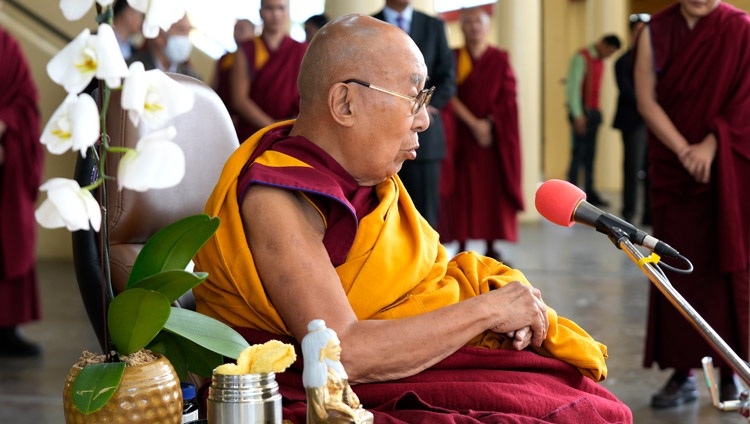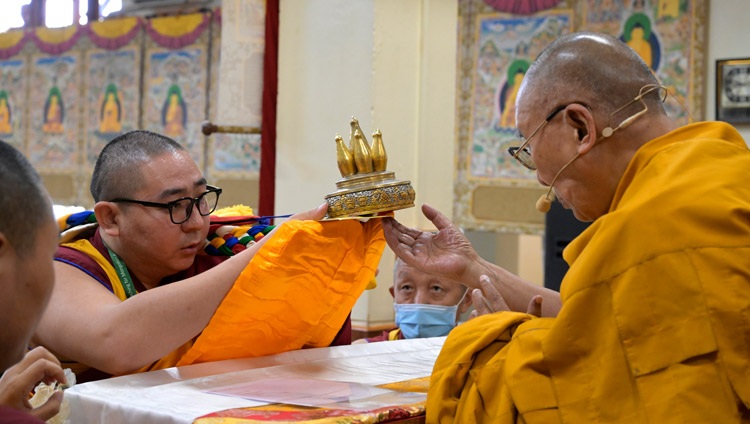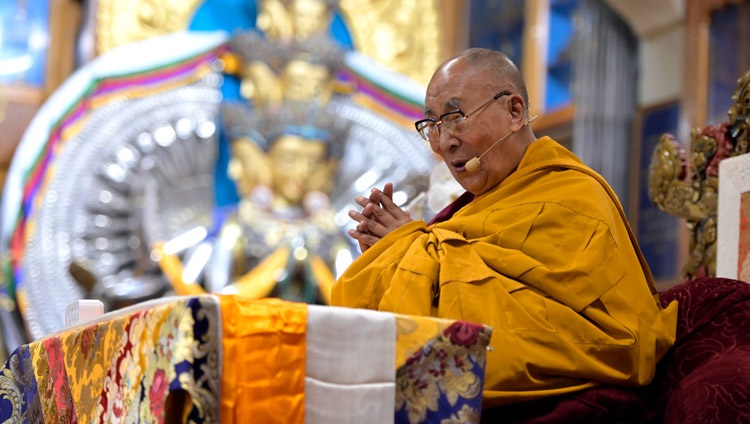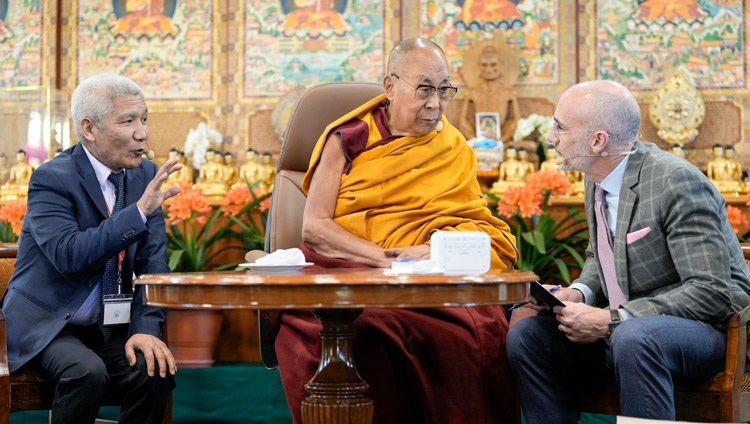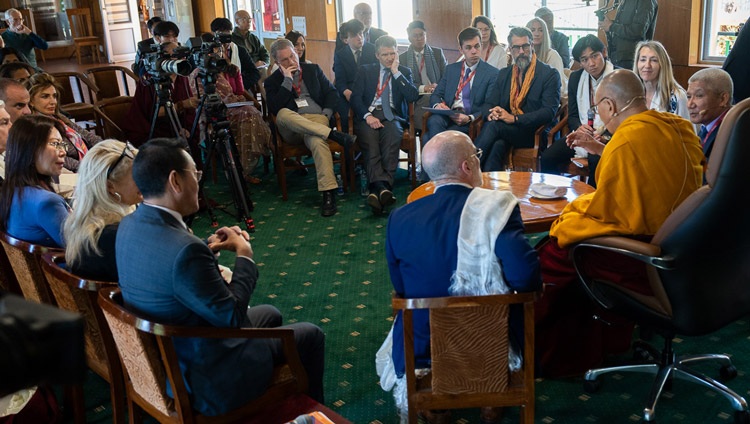Closing Ceremony of the Great Summer Debate July 10, 2017
Disket, Nubra Valley, J&K, India – His Holiness the Dalai Lama flew from Leh into the Nubra Valley in the north of Ladakh by helicopter this morning. The skies were a luminous blue. He was met on arrival by Thiksey Rinpoche, Khelkhang Rinpoche, Dr Sonam Dawa, Chief Executive Councillor of the Ladakh Autonomous Hill Development Council (CEC LAHDC), local MLA and Minister for Ladakh Affairs, Tsering Dorjee, and local officials.
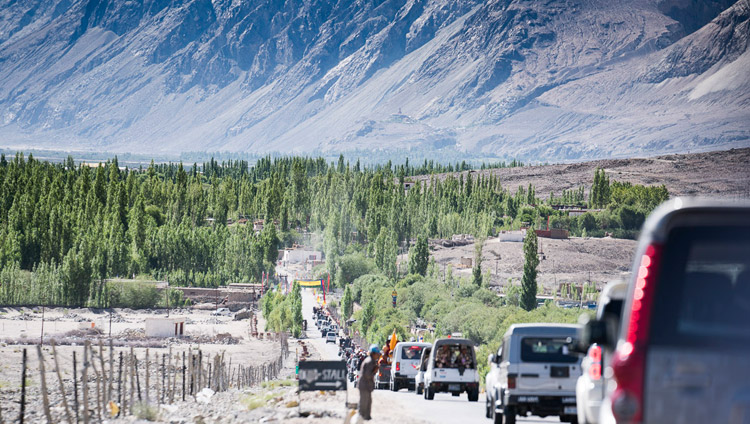
Local people, men, women and children in their best clothes, monks and nuns and members of the Muslim community also with white scarves in their hands lined the road from the airport. When His Holiness reached Disket Monastery he was received again by Thiksey Rinpoche and Ganden Trisur, Rizong Rinpoche. After a short rest he joined local dignitaries for lunch.
At the teaching ground His Holiness was ushered into the new temple where he lit a butter lamp to inaugurate the day’s events and performed a brief consecration. Once he had greeted other Lamas and guests, and waved to the crowd he took his seat. Geshe Tharchin introducing the events explained that due to His Holiness’s kindness the Great Summer Debate had been inaugurated and had been held at Choglamsar, Likir, Spituk, Thiksey and now here at Disket in Nubra. Monks and nuns from different institutions had been invited, while Muslim brothers and sisters had also taken an interest. He expressed gratitude that His Holiness had agreed to grace the closing ceremony by his presence.
Thiksey Rinpoche made the customary threefold mandala offering and children from the Lamdon School led the congregation in singing the Indian and Tibetan national anthems. As a token of gratitude, Thiksey Rinpoche presented His Holiness with a fragrant sandalwood statue of Maitreya.
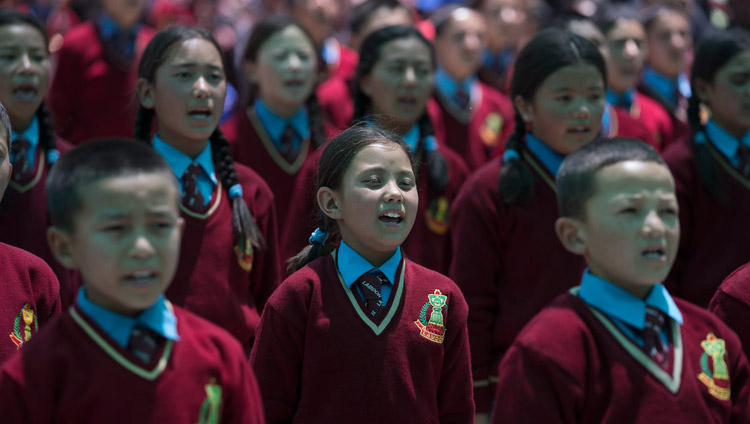
The Abbot of Disket spoke of his appreciation of His Holiness’s efforts to deepen understanding of Buddhism throughout the Himalayan Region by giving teachings and empowerments. Consequently, people had learned that Buddhism is not about blind faith, because it is based on reason and logic. He reminded everyone that Disket Monastery was founded in the early fifteenth century by Changsem Sherab Zangpo, a direct disciple of Je Tsongkhapa. Today, of almost 180 monks, 57 are here in Disket while many others are studying at the great monasteries of Tashi Lhunpo and Drepung Gomang in South India. He mentioned that 180 monks and nuns from 18 different monastic institutions had taken part in the Great Summer Debate this year. In conclusion he prayed that His Holiness live long.
Monks from the great seats of learning were the first to debate in front of His Holiness. They engaged in a vigorous discussion of themes from Thogme Sangpo’s ‘37 Practices of a Bodhisattva’. At the end His Holiness called them up to commend them.
Dr Sonam Dawa, (CEC LAHDC), spoke of the people of Ladakh’s good fortune that not only does His Holiness visit their region more regularly than other parts of the world, but he also stays longer. He advised that it is important not just to make good wishes but also to put them into effect. He appealed to everyone present to heed His Holiness’s advice.
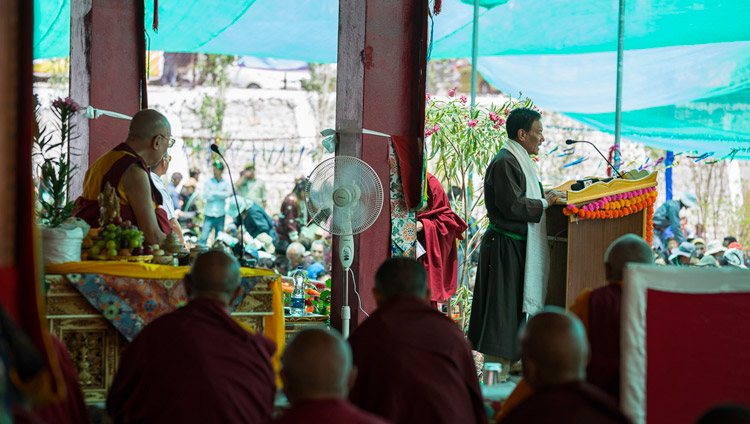
Young students of Disket Monastery then made a presentation of their debate skills in which they discussed ‘collected topics’.
Tsewang Thinles, President of the Ladakh Buddhist Association, thanked the people of Nubra for their help and support for the Great Summer Debate. He appealed to his listeners to remember that “His Holiness comes with high hopes for us; let’s not disappoint him”. He noted that the benefits of debate need not be confined to members of the monastic community. On behalf of the local community he pledged that they would do their best to maintain religious harmony.
Children from the Lamdon School presented a debate on the theme of colours.
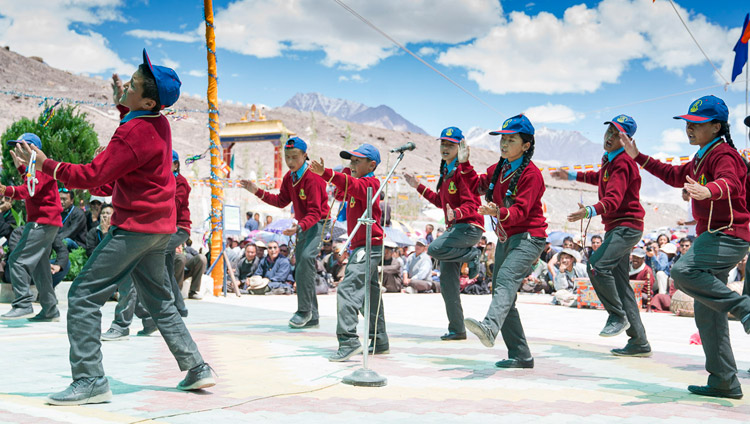
On behalf of the Muslim community in Ladakh in general and of Nubra in particular Ghulam Mohammed extended greetings to His Holiness on his recent birthday. “We appreciate how you offer your good advice not only to Buddhists but to people of all faiths. Religious harmony is of benefit to us all and we thank you for your contribution to it. We congratulate everyone who has taken part in the Great Summer Debate and look forward to participating and supporting it in whatever way we can next time.”
Thupten Tsewang, MP for Ladakh reminded the crowd of His Holiness’s advice to learn to understand your own religion while maintaining a clear respect for others. He added, “His Holiness has been so kind to us, advising us to keep our traditions and values alive, that we should not forget the difficulties facing the people of Tibet.” He prayed that His Holiness will come to Ladakh again and again.
Former Ganden Throneholder, Rizong Rinpoche, mentioned that Buddhism has faced ups and downs in its history, but that today, due to His Holiness’s kindness, awareness of it has spread across the world. While the Dalai Lamas have been crucial to the protection of Buddhism and the Geluk tradition, Rinpoche quoted Kyabje Phabongka telling Trijang Rinpoche, who was to become His Holiness’s Junior Tutor, that “this Dalai Lama will be unprecedented in the lineage—through his enlightened deeds his contribution will be equivalent to those of all the previous Dalai Lamas put together”.
With regard to the dream His Holiness has reported having indicating that he could live to 113, Rizong Rinpoche asserted, “Whether this foresight is fulfilled depends on whether we heed and follow his advice.”
The people of Nubra requested His Holiness to present a certificate of their appreciation to Ven Thiksey Rinpoche, who, in addition to his senior status among Buddhist teachers of Ladakh, has a role overseeing Disket Monastery.
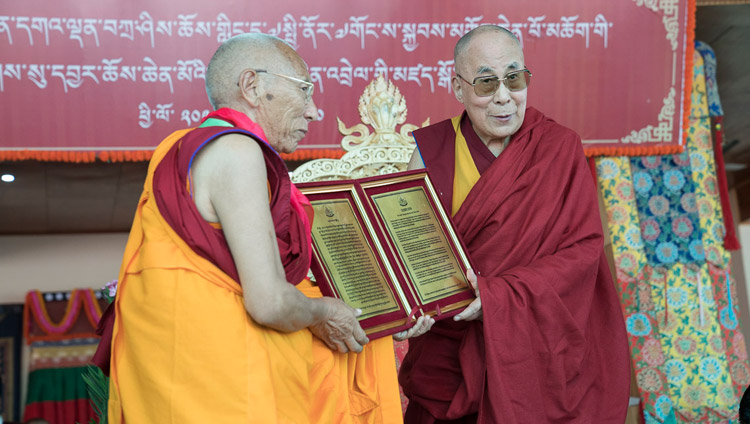
At the start of his address to the estimated 7000 people gathered before him, many seated under umbrellas to shield them from the blazing sun, His Holiness acknowledged the presence of Ganden Trisur Rinpoche, from whom he said he has received many teachings, Thiksey Rinpoche and other dignitaries. He expressed appreciation of the work that had gone into holding the fifth Great Summer Debate. He said that he felt such meetings had more to do with learning than with religion.
“Among the five or ten major sciences are included Sanskrit or linguistics, medicine, the arts and inner science, which is related to inner peace. From an academic point of view too, inner science could be about developing peace of mind and promoting it in the world. Secular ethics is likewise related to inner science. I was glad to hear the Muslim representative say that his brothers and sisters were interested in taking part in our debates.
“Understanding these instructions thoroughly requires a threefold approach. Listening to or reading about a topic, reflecting on it and coming to a firm understanding through meditation. Developing an initial acquaintance with something through listening or reading is not enough to bring about transformation. Whatever you hear or read about, you need to apply the fourfold reasoning to it to really understand it. You might ask in relation to something—‘Is it a particle? Or is it not a particle? Is it both a particle and not a particle? Or is it neither a particle nor not a particle?’
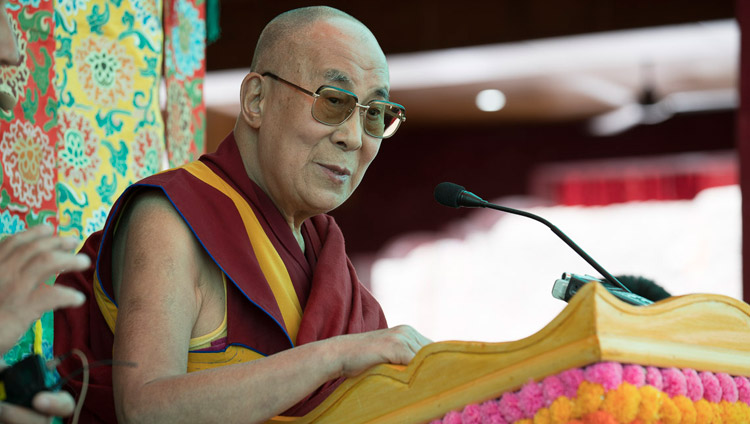
“Since we came into exile, debate and analytical study have not been confined to monastics, but have been made available to laypeople, as well as school and college students. This use of reason and logic is unique to our tradition. Training in them has allowed me during more than 30 years of discussions with scientists to be able to identify inconsistencies in their theories and presentations. Watching monks debate in South India during one of the Mind & Life conferences held there, they were impressed and wanted to know if this method could be applied to other topics. I told them, yes, and that debate certainly helps to exercise and sharpen intelligence.
“The Buddha advised his followers,
O monks and scholars,
As gold is tested by burning, cutting and rubbing,
Examine my words thoroughly
And accept them only then—not just out of respect for me.
“Consequently the masters of Nalanda examined the scriptures and concluded that while some can be taken literally, others have a need to be seen as provisional or subject to interpretation.
“That’s all I —have to say—we’ll meet again in the coming days.’
In his words of thanks, in addition to expressing gratitude to His Holiness, Bhikshu Lobsang Tenzin thanked those among the scholars who had come to attend the Great Debate who went into schools to explain the Four Noble Truths within an introduction to Buddhism.
Tomorrow, His Holiness will be teaching the middle volume of Kamalashila’s ‘Stages of Meditation’ and Thogme Sangpo’s ‘37 Practices of a Bodhisattva’.
Source: https://www.dalailama.com/news/2017/closing-ceremony-of-the-great-summer-debate

